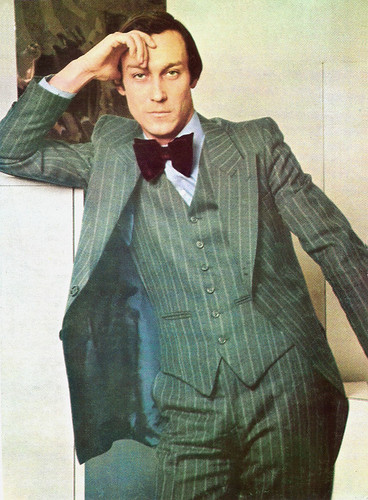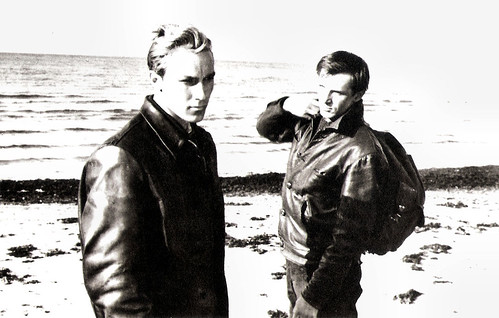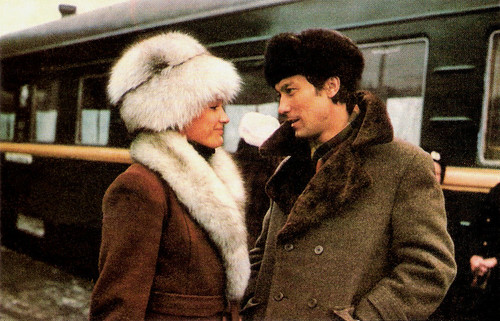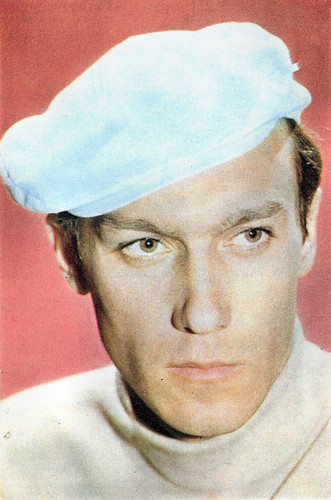Russian postcard.
Russian postcard.

Romanian postcard by Casa Filmului Acin.
Aristocratic Bearing and Handsome Features
Oleg Ivanovich Yankovsky or Yankovskiy (Russian: Олег Иванович Янковский) was born in the village Jezkazgan, Kazakh SSR, USSR (now Jezkazgan, Kazakhstan) in 1944. He was born into a noble family of Polish origin. His father, a former tsarist army officer who joined the Red Army, was exiled and later died in a Gulag labour camp during Josef Stalin's crackdown on Trotskyites in the military.
After Stalin's death in 1953, the family settled in Saratov, in southern Russia. In 1957 Oleg's older brother Rostislav, an actor, went to Minsk. Back in Saratov, Oleg intended to become a dentist but a casual visit to the Slonov Theater Academy, the local drama school where his brother had studied changed his mind.
After marrying fellow student Ludmilla Zorina, he graduated in 1965 with an appearance in The Three Sisters before joining the Saratov Drama Theatre. A year later, aged 22, he appeared in his first film, O lyubvi/A Ballad of Love (Mikhail Bogin, 1966), and immediately impressed with his aristocratic bearing and handsome features.
His film career was launched, when he was cast in two films about World War II, Shchit i mech/The Shield and the Sword (Vladimir Basov, 1968) in which he played an arrogant German officer, and Sluzhili dva tovarishcha/Two Comrades Were Serving (Yevgeni Karelov, 1968).
About Sluzhili dva tovarishcha, Ronald Bergan wrote in his obituary of Yankovskiy in The Guardian: “Yankovsky played a student who joins the Red Army during the civil war, fighting for the revolution not only with his gun, but with his camera. The performance demonstrated Yankovsky's skill in playing heroic roles with a certain irony, without resorting to the larger-than-life mannerisms in Soviet cinema of the 1950’s. However, despite the ‘Thaw’ period following Khrushchev's famous speech in 1956 attacking Stalin's ‘cult of personality’, a new era of repression had set in by the time Yankovsky made his screen debut.”

Russian postcard, no. 2129783, 1980. Photo: publicity still for Shchit i Mech/The Shield and the Sword (Vladimir Basov, 1968).
Russian postcard.

Russian postcard by Izdanije Byuro Propogandy Sovietskogo Kinoiskusstva, no. 109/77, 1977. (This postcard was printed in an edition of 200.000 cards. The price was 5 kop.). Publicity still for Slovo dlya zashchity/A Word for the Defense (Vadim Abdrashitov, 1977).
Intensely Personal, Dreamlike and Somewhat Hermetic
In the west we have only little idea of how much Oleg Yankovsky was revered in his own country, in both Soviet and post-Soviet times, equally on stage and in films. In 1973, he joined Mark Zakharov's Lenin Komsomol Theatre in Moscow, and became one of its leading actors.
He starred in the TV versions of such Lenkom productions as Obyknovennoye chudo/An Ordinary Miracle (Mark Zakharov, 1978) and Tot Samyy Myunkhgauzen/The Very Same Munchhausen (Mark Zakharov, 1979). Despite the mediocrity of the majority of the films he appeared in during the stagnant Brezhnev years, he managed to humanise historical figures by expressing certain deep emotions, lifting his portrayals of Communist Party leaders above the popular film stereotypes. In 1974, he played a Communist Party official in Premiya/The Bonus (Sergei Mikaelyan, 1974), a film that generated international attention for its frank examination of mismanagement and fraud in the Soviet construction industry.
In the west we know Oleg Yankovsky only from a handful of films. He was cast to play the father in Tarkovsky's intensely personal, dreamlike and somewhat hermetic Zerkalo/The Mirror (Andrei Tarkovsky, 1975). Philip Riley in his obituary of Yankovsky in The Independent: “a multi-layered oneiric autobiography, Yankovsky played a loose depiction of the hero's father, the poet Arseny Tarkovsky, whose verses are heard on the soundtrack. The complex layering included casting various members of Tarkovsky's family and, as one of the children, Yankovsky's son Philip.”
Zerkalo was the first of his films to be shown widely in the west. But he had to wait another eight years, for the main role in Tarkovsky's Nostalghia/Nostalgia (Andrei Tarkovsky, 1983), before he was internationally recognised again. Ronald Bergan: “Thankfully, This time he played the lead role – a Russian poet and musicologist doing research at a spa in the Tuscan hills. As an obscure act of faith, Yankovsky crosses an ancient sulphur pool from one side to the other carrying a lighted candle. With his lean, ascetic face and dark eyes, he was ideal as a man in extremis, through whom Tarkovsky, in his first film made outside the Soviet Union, expressed his melancholy and homesickness”.
Other of his internationally known films are Moy laskovyy i nezhnyy zver/The Shooting Party (Emil Loteanu, 1978), based on the Anton Chekhov story, where he was superb as Kamyshev, an intellectual crushed by the pettiness and false morality of a small provincial town; Polyoty vo sne i nayavu/Flights in Dreams and Reality (Roman Balayan, 1982), electrifying as a complacent adulterer painfully forced to reassess his life; Vlyublyon po sobstvennomu zhelaniyu/Love at His Own Choice (Sergei Mikaelyan, 1983), as a former champion bicyclist who is rescued from his drunken ways by a plain-looking librarian; Kreytserova sonata/The Kreutzer Sonata (Sofiya Milkina, Mikhail Shvejtser, 1987), adapted from Leo Tolstoy, where his portrayal of jealousy erupting into hate is a tour de force; and Pasport/The Passport (Georgi Daneliya, 1991), about a case of mistaken identity which leaves a Russian man stranded in Israel.
Russian postcard.
Russian postcard.

Russian postcard by Izdanije Byuro Propogandy Sovietskogo Kinoiskusstva, no. 106/72, 1972. Photo: Ter-Ovanesova. (This postcard was printed in an edition of 260.000 cards. The price was 6 kop.).
People's Artist of the Soviet Union
Oleg Yankovsky’s few western films are reportedly not among his best. In Tsareubiytsa/Assassin of the Tsar (Karen Shakhnazaro, 1991) he played a psychiatrist who is a look-alike of Tsar Nicholas II treating a man (Malcolm McDowell), who thinks himself the regicide. Mute Witness (Anthony Waller, 1994) is a British thriller set in a Russian film studio. While Sally Potter's transatlantic gypsy melodrama The Man Who Cried (2000) divided critics, Yankovsky impressed as Christina Ricci's Jewish father, who emigrates to the US from Russia.
In 1991, Yankovsky was the last actor to be awarded the title of People's Artist of the Soviet Union. He continued to receive awards for his work with several Nika Awards from the Russian Film Academy for his directorial debut Prikhodi na Menya Posmotret/Come Look At Me (Oleg Yankovskiy, 2001) and for his role in Lyubovnik/The Lover (Valery Todorovsky, 2002).
Starting in 1993, Yankovsky ran the Kinotavr Film Festival in Sotchi. He appeared as Count Pahlen in the drama Bednyy, bednyy Pavel/Poor, Poor Pavel (Vitali Melnikov, 2004) and as Komarovsky in a TV adaptation of Doktor Zhivago/Doctor Zhivago (Aleksandr Proshkin, 2006). His penultimate role was as Karenin in a television adaptation of Anna Karenina (Sergei Solovyov, 2009).
The last film Yankovsky appeared in was Tsar (Pavel Lungin, 2009) which was presented in the Un Certain Regard section at the Cannes Film Festival, just three days before his death. He was being highly praised for his dignified and spiritual performance of the Metropolitanate Philipp, childhood friend and adviser of Ivan the Terrible (Pyotr Mamonov), and his only adversary.
In 2009 Oleg Yankovsky died of pancreatic cancer in Moscow, aged 65. He is survived by his son, the actor and film director Filipp Yankovsky, who appeared as a young child in The Mirror, and his wife, the Lenkom actor Lyudmila Zorina.
Original trailer for Zerkalo/The Mirror (1975). Source: Whimpysinger (YouTube).
English DVD-trailer of Nostalghia (1983). Source: Peaseporridge (YouTube).
Trailer of Assassin of the tsar (1993). Source: PeterShop.com - Russian Movie (YouTube).
Sources: Ronald Bergan (The Guardian), John Riley (The Independent), Bloomberg News (The New York Times), Wikipedia and IMDb.
No comments:
Post a Comment